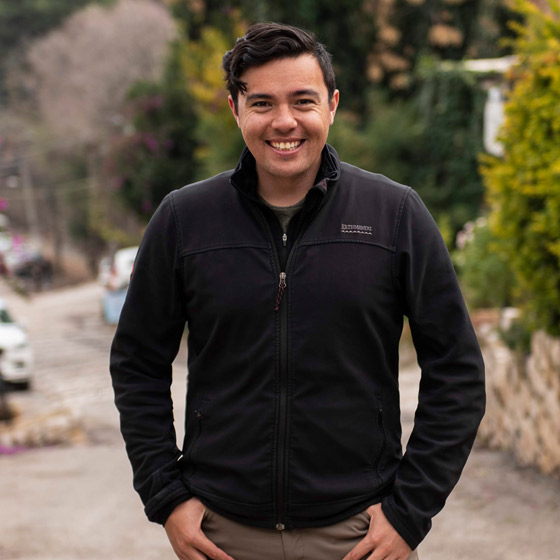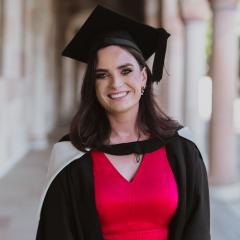
Bachelor of Arts (Psychology) Graduate and Valedictorian
What inspired you to study this program at UQ?
Existential curiosity. I have always wanted to explore the varieties of human experience, of love, consciousness, suffering, death, growth and meaning. UQ offers unique breadth as psychology can be pursued through arts (HASS) and sciences (HABS).
Only at UQ can you blend insights of art, drama, philosophy, anthropology and sociology with the scientific rigor of statistics, experimental design and contemporary psychological research. I think this sort of ‘cross-pollination’ has the potential to create more creative, human centered, historically informed practitioners of psychology.
What has been your most memorable moment at UQ?
Over the years I have fallen in love with the architecture and grounds of UQ. In the earliest morning, before the jacaranda petals are swept up, the paths are fragrant, draped in delicate purple.
I remember arriving very early one year to sit my final statistics exam. I looked up at the blooming canopies as I walked the quiet path from the lake to the exam center. Somehow that settled my nerves. After the exam I went to find the ice cream man - a little ritual of mine that signifies the end of semester - bought a rainbow sprinkle soft-serve and found a nearby bench. A few bites in, a jacaranda petal fell atop the melting cone, and for no particular reason, that moment has never left me.
How did you manage to balance your study, work and other extracurricular activities?
Managing life commitments with study was very difficult. When I returned to study, I was married, working full-time, had a mortgage, a full social calendar and was planning to have our first child. My wife was also studying and running her own business. Something had to give.
We managed through constant adjustment - negotiating flexible work, skipping social events, reducing expenses, blocking out time around assessment deadlines. At times it felt overwhelming, like I wasn’t doing anything well or to my full ability. I’ve had to deal with perfectionism and learn to accept that good enough is not a compromise but an achievement in itself when juggling several commitments.
What drove you to become such a high achiever?
I am driven more by curiosity than achievement, but I find that the two are linked. When you get in the habit of asking “I wonder if…” it leads to new opportunities, directions, and connections. Being curious is not an achievement but a way of being. Curiosity has always helped me become more creative, confident, positive and open to try new things. Best of all, curiosity is alive, spontaneous and self-propelling. Some high achievers credit their success to color-coded planners, superhuman willpower and sacrifice. I think organization and discipline can work but I find the messy, iterative journey of curiosity more exciting.
Would you like to share any major obstacles or hardships you have overcome throughout your studies?
My son was born in the mid-semester break last year (2021) which meant my transition to parenthood coincided with my final semester of my undergraduate study. I would be listening to lectures about the predictors of poor parental adjustment while rocking a sleepless baby on my knee at 4am.
I haven’t quite figured out parenting: he is now a precocious toddler who likes to slap my laptop screen when I’m trying to write essays. I have, however, found having him to be a desirable difficulty. Just as he makes life more difficult, he makes it more worthwhile. I am more motivated to apply myself, live my values, and work hard knowing that he is watching and learning. I am more determined knowing that both his future and mine depend on how engaged I am every day.
What are you most passionate about?
I am most passionate about psychotherapies that help people recognise their strengths so they may grow, heal and create lives of meaning, freedom and authenticity. In philosophy, this is the good life, eudaimonia or flourishing. I believe that psychology can and should extend its core agenda beyond relief from struggle and clinical disorder and strive toward increasing life satisfaction and value fulfillment.
The good life sounds vague and romantic, almost unscientific, but there is plenty of evidence to show psychology can create the conditions for flourishing through social connection, mindfulness and compassion.
You have had a varied journey to get to UQ, what led you to study here?
I first studied psychology and philosophy at UQ in 2009 after leaving school. I was a curious student, enthusiastic about the ideas, but I neglected to do any assessable work. I wondered what it was like to work out there, so I packed up, quit study and joined the Army as a Military Police Officer.
I spent a few years in Townsville before packing up again to complete long-distance hikes in Asia and the Middle East. I walked a few thousand kilometers in beautiful, dangerous places before coming back to work in marketing and advertising.
The decision to study again was sudden. I was at a conference in the Philippines about keyword optimization and I asked myself whether marketing could sustain my interest for the next 30 years. No, not for me. So, I rewound the tape of my life and tried to pick out what had always been there and found it was psychology and philosophy. It looped me back to where I started at UQ - back in the same buildings doing the same courses, but second time round I knew myself a little better and was ready to do the work.
What do you believe it takes to become valedictorian?
Just showing up and being interested in your classmates and teachers is essential. You’ve got to be in the room. Once you’re there, jump in and start conversations with your peers - no one likes awkward silence, but no one wants to talk first. Prepare to participate in class discussion. The more you prepare, the more confident you’ll be saying what you think when tutors ask. When you contribute, make it valuable and inquisitive, not a flex as the youth might say. To the mature age students like me out there, try to keep it clear and short.
Beyond the classroom, there are ample opportunities to get involved in workshops, conferences, representation, student societies and interesting projects both within and outside UQ. Brisbane is a small place, so you will get known very quickly if you’re involved in the same spaces.
What does being awarded Valedictorian mean to you?
I was profoundly moved when I found out that I was valedictorian. I felt accepted and celebrated by those I deeply admire: my peers and the staff of the School of Psychology. It means more to know that valedictorians are nominated on how they reflect the spirit and values of UQ, rather than solely on academic merit. I am immensely proud to represent such a distinguished school and my outstanding peers.
What advice would you give to current and future UQ students?
Learn to write and speak well. Good writing sharpens your logic, clarifies thinking, directs research, and makes you confident in your own voice. When writing is fresh, clear and creative it stands out - good communicators are rare.
Good public speakers are even rarer. Avoiding cookie cutter writing has served me well throughout life and study. We tend to ignore generic, boring information that could have been spat out by AI. We are drawn to unique voices and perspectives, not brute facts. Luckily as students we have the ability to find our voices, hone our perspectives and practice styling facts in interesting ways.
What’s next for you?
My future is open at the moment. I’m aiming at further study in psychology, hopefully here at UQ in the Master of Psychology (Counseling). But as many know, post-graduate training in psychology is ultra-competitive and there are many deserving, hard-working applicants. I’m also pursuing clinical and research opportunities with a focus on male mental health. Over the next couple of years, I’ll continue to write about existential and positive psychology with the aim of publishing a popular press book.
In the break I’m off to Korea to hike 450 km on Jeju Island with my son in a backpack!
Learn about your different options with UQ's Bachelor of Psychological Science (Honours) or Bachelor of Arts with a major in Psychology.


